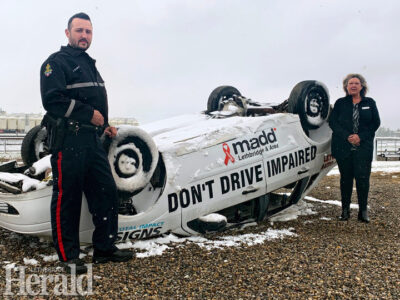MADD Crashed Car campaign sends message on impaired driving
By Herald on May 20, 2021.
 Lethbridge police traffic sergeant Jason Darby and Anita Huchala, president of Mothers Against Drunk Driving for Lethbridge, are hoping to send a message with MADDÕs Crashed Car campaign on the consequences of impaired driving. Herald photo by Dale Woodard
Lethbridge police traffic sergeant Jason Darby and Anita Huchala, president of Mothers Against Drunk Driving for Lethbridge, are hoping to send a message with MADDÕs Crashed Car campaign on the consequences of impaired driving. Herald photo by Dale WoodardDale Woodard – Lethbridge Herald
A car was spotted overturned on Highway 3 heading east out of Lethbridge.
This single vehicle crash, however, was a staged one with a dire message as the MADD Lethbridge & Area Chapter relaunched their Crashed Car campaign warning of the horrific consequences of impaired driving.
From May 20 to Sept. 7, MADD – working in conjunction with Lethbridge Police Services and the RCMP – will have the Crashed Car placed in various locations around Lethbridge and southern Alberta to serve as a vivid reminder to not drive impaired.
Speaking at Vantage Trailer Sales – the site of the crash – at the official launch Thursday morning, Anita Huchala, president of Mothers Against Drunk Driving for Lethbridge, said the open and visible location of the “crash” is to catch the attention of passers-by and hopefully get the conversation going about the perils of impaired driving.
“They have a very visible location as what we’re hoping to do with our crashed car is you’ll see it in various locations around southern Alberta. As people drive by, we hope it sparks that conversation with those in the vehicle so they decide to plan ahead, not ride with an impaired driver or designate a driver. It’s a great way to open that conversation with those in the vehicles.”
The first Crashed Car campaign was held last year.
“We had lots of great feedback because it did exactly what we said. It started that conversation and made them think twice and it brought awareness that yes, impaired driving is still out there and we need to do something about it,” said Huchala. “That is exactly what we’re trying to do, to increase that conversation and bring that awareness so that people are making the right decision. I do honestly feel we can stop impaired driving. With the crashed car, we have seven of those in Alberta and we built 55 relationships last year by having the crashed car in different locations and that covered 38 municipalities. I feel that is going to work very strongly in the public so that people do make the right decision.”
Huchala said she feels the message is getting out, “but whenever you speak with our first responders they will tell you impaired driving is still happening.”
Huchala said the Crashed Car – with the message “Don’t Drive Impaired” written down the side – will be moved every two weeks.
“We found if it gets any longer than that it gets stagnant and people don’t pay attention to it. So we will be rolling it out in different locations because our location is so vast. MADD Lethbridge and area handles all of southern Alberta. We’re going to be moving it to different areas such as Milk River, Pincher Creek, Fort Macleod and it will be out in Coaldale as well. You’ll see it moving around and hopefully we can touch a lot more people that way.”
Huchala also noted the importance of working with the LPS and the RCMP.
“It’s very strong because they are the ones that go to these impaired crashes first hand,” she said. “They are the ones that have to deal with these families and do death notifications. So it becomes very difficult for them to go through this. So if we can work with them and they work with us we can stop impaired driving.”
Jason Darby, acting sergeant in charge of the traffic response unit for the Lethbridge Police Service, said impaired driving is not something the police can tackle by themselves.
“We need our community partners to help us with that,” he said. “Unfortunately all too often, we still come across impaired drivers on the road.”
Darby said a common misconception is the COVID-19 pandemic has caused a reduction of impaired driving.
“Although we do see licensed establishments and bars not open, that may have a bit of an effect on impaired driving. We’ll run check stops throughout the year, not just holiday seasons, and even in those times we still come across impaired drivers.”
Darby said they might see a spike in impaired driving during holidays, but it’s something that needs to be dealt with 365 days of the year.
“We advertise a lot more in the holiday season when we’re doing our check stops, but we do them throughout the year and we frequently find impaired drivers routinely at check stops,” he said. “I don’t want to make it sound like it’s a rampant problem and you need to be scared when you’re on the roads, I just want to make sure it’s clear it’s a problem that’s not going away and that’s why partnering with MADD and these awareness campaigns are crucial to getting the word out there.”
Follow @DWoodardHerald on Twitter
21-20




